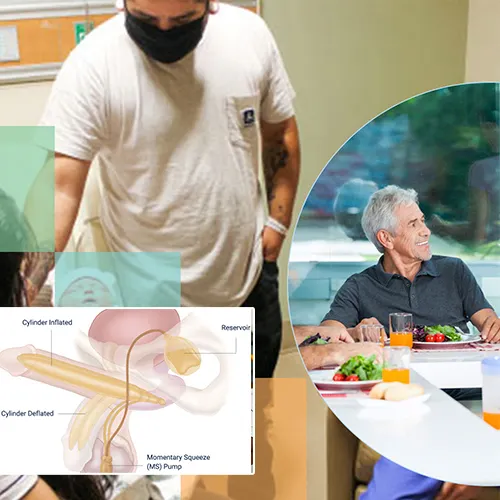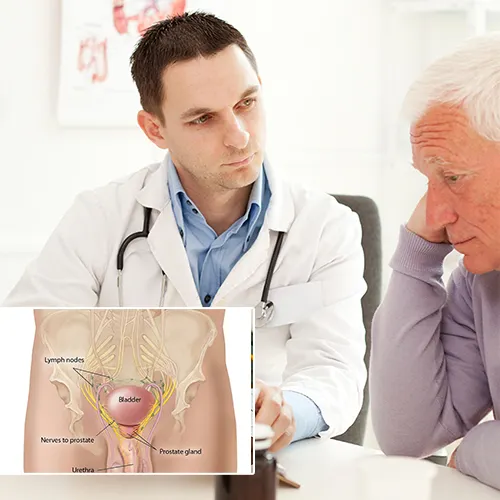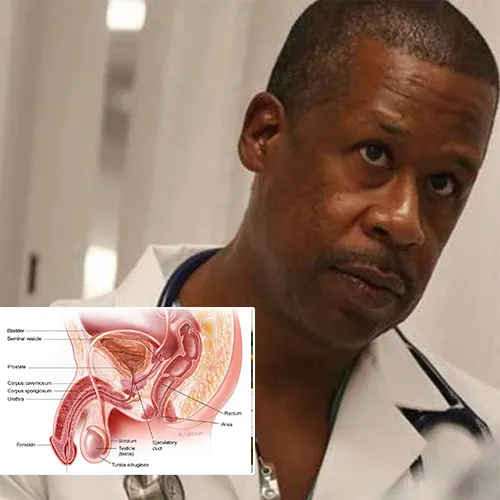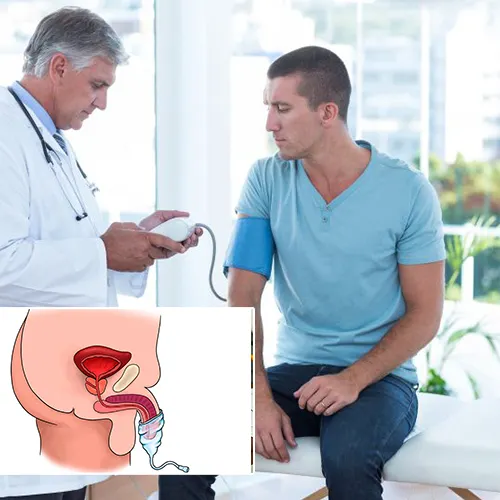Mens Health: Lifestyle Adjustments Penile Implants Information
Table of Contents []
- Lifestyle Adjustments Penile Implants
- Welcome to Atlanta Outpatient Surgery Center : Guiding You Through Recovery from Penile Implant Surgery
- Creating a Safe Environment for Your Recovery
- Managing Pain and Discomfort During Recovery
- Maintaining Your Overall Health and Well-being
- Contact Us at Atlanta Outpatient Surgery Center for Support and Guidance
Lifestyle Adjustments Penile Implants
Welcome to Atlanta Outpatient Surgery Center : Guiding You Through Recovery from Penile Implant Surgery

Undergoing penile implant surgery marks a courageous step toward reclaiming your sexual health and intimacy. At Atlanta Outpatient Surgery Center , our esteemed medical professionals, led by a renowned surgeon, realize that postoperative care is just as critical as the procedure itself. It's important to embrace lifestyle adjustments for a healthy and swift return to daily activities. Our team is committed to supporting you every step of the way. We provide national service and can easily be reached for questions or to book an appointment at (404) 252-3074.
Recovery from this surgery means allowing the body to heal while gradually reintroducing activities. Specific lifestyle adjustments ensure a smooth transition back to routine. We want your recovery to be uneventful and have prepared a comprehensive guide to assist you.
Initial Rest and Recuperation
Adequate rest is paramount after surgery. The body needs time to heal, and pushing beyond prescribed limits can compromise the healing process. It's essential to follow the guidance provided to you, including:
Resting in a comfortable, supportive environment.
Limiting physical activity as directed in the initial days following surgery.
Using prescribed medications, such as pain reliefs or antibiotics, to manage discomfort and prevent infection.
Activity Modifications
Upon returning home, you'll need to adjust your activities to avoid placing stress on the surgical site. Our attentive staff can provide detailed recommendations, but here are some general guidelines:
Avoid heavy lifting or vigorous exercise for 6-8 weeks.
Walk and move around at intervals to promote circulation.
Abstain from sexual activity for a timeframe specified by your doctor.
Personal Care and Hygiene
Maintaining good hygiene is crucial for preventing infection and promoting healing. It's generally advised to:
Keep the surgical area clean and dry.
Change dressings according to your doctor's instructions.
Watch for signs of infection and report them to our team immediately.
Follow-up Appointments
Attending follow-up appointments with your surgeon is a non-negotiable aspect of recovery. These check-ups allow us to:
Monitor the healing process.
Make any necessary adjustments to your treatment plan.
Address any questions or concerns that may arise.
Emotional Well-being
It's normal to experience a range of emotions post-surgery. Our compassionate staff offers resources to support your mental and emotional health:
Encouragement to discuss feelings with loved ones or a counsellor.
Assurance that feelings of anxiety or depression are common and manageable.
Suggestions for support groups or therapy sessions.
Creating a Safe Environment for Your Recovery

Ensuring your living space is conducive to recovery is crucial. Adjusting your home environment can make a significant difference in your comfort and convenience during this period. At Atlanta Outpatient Surgery Center , we urge you to consider the following changes to expedite your healing:
Avoid stairs and set up a comfortable rest area on the ground floor, if possible. Prepare by gathering necessities such as medications, water, and entertainment within arm's reach of your rest area. This preparation minimizes strain on your body and conserves your energy for the healing process.
Home Setup for Accessibility and Safety
It is important to make modifications to your home to reduce the risk of falls and ensure easy access to essential items. This may include:
Installing grab bars in the bathroom.
Removing tripping hazards such as loose rugs and cords.
Arranging for assistance with daily chores and errands.
Nutrition for Healing
A balanced diet plays a critical role in your recovery. It aids the body in repairing tissues and fending off infections. We suggest focusing on:
A diet rich in fruits, vegetables, lean proteins, and whole grains.
Staying hydrated with water and avoiding excessive caffeine and alcohol.
Considering supplements, as recommended by your healthcare provider.
Medication Management
Managing your medications effectively is vital to prevent complications. Be sure to:
Take your medications as directed.
Understand the purpose and potential side effects of each medication.
Keep a list of your medications and share it with any healthcare provider you visit during your recovery.
Preparing for the Unexpected
No one anticipates complications, but being prepared can help you deal with them efficiently should they arise. Have a plan in place that includes:
Knowing the signs of complication, such as increased pain or redness.
Keeping emergency numbers and your doctor's contact information handy.
Having a support system in place, such as family or friends, who can assist swiftly.
Managing Pain and Discomfort During Recovery

Managing postoperative pain is key for a comfortable recovery. Pain and discomfort can be mitigated with proper medication and strategies. Our medical experts at Atlanta Outpatient Surgery Center recommend the following to keep discomfort at bay:
&p Feeling some pain after surgery is expected. However, with the right strategies, these can be managed effectively, aiding in a better and faster recovery. These strategies may include:Using over-the-counter pain relievers as advised.
Employing techniques such as ice packs to reduce swelling.
Elevating the surgical area to decrease discomfort.
Understanding Your Pain Relief Options
Your doctor will discuss the most appropriate pain management plan for your personal needs. Depending on your surgery and health, this may include:
Prescribed medication regimes.
Over-the-counter anti-inflammatory drugs.
Alternative methods such as acupuncture or physical therapy.
Non-Medication Pain Relief
Alongside medication, other approaches can supplement pain relief. These methods are useful tools to have in your recovery arsenal:
Gentle exercises, as recommended by your healthcare provider.
Relaxation techniques such as deep breathing exercises or meditation.
The use of heat or cold therapy for short periods.
Monitoring Your Symptoms
Keeping a close watch on your pain levels and any other symptoms is fundamental. You should promptly report any changes to us, such as:
A sudden increase in pain or discomfort.
Any discharge or unusual changes at the surgery site.
New symptoms that were not present immediately after surgery.
Setting Realistic Expectations
Recovery time can vary from person to person. It's important to:
Understand that healing is a process that can't be rushed.
Maintain a positive outlook and celebrate the small progress milestones.
Regularly consult with your doctor to ensure recovery is on track.
Maintaining Your Overall Health and Well-being

The healing journey extends beyond physical recovery. Taking care of your overall health also involves nurturing your mental and emotional state. A strong mindset aids in a more enjoyable journey to wellness. Atlanta Outpatient Surgery Center emphasizes a holistic approach to your aftercare:
Build a strong support network of family, friends, and professionals who understand what you're going through. Engaging in light, enjoyable activities that keep your spirits up can also be beneficial. We're here to help you find the balance necessary for a full and comprehensive recovery.
Engaging in Light Physical Activity
While strenuous activity is off-limits, light physical activity can be very beneficial for your recovery, such as:
Short walks to maintain circulation.
Gentle stretching exercises to ease muscle stiffness.
Any light activity that's approved by your medical professional.
Mental and Emotional Health
Your state of mind has a profound influence on your physical healing process. To support your mental and emotional well-being, consider:
Joining a recovery support group.
Speaking with a mental health professional if you're struggling with emotional burdens.
Engaging in hobbies or interests that relax and invigorate you.
Long-term Lifestyle Changes
Investing in long-term lifestyle changes now can continue to benefit your health long after you've recovered from surgery. It's worthwhile to:
Commit to a healthier diet and moderate exercise routine.
Reduce or eliminate smoking and excessive alcohol consumption.
Explore new activities that keep you mentally and physically engaged.
Check-ups and Communication with Your Doctor
Keeping in touch with your healthcare team is critical. Ensure you:
Schedule and attend regular check-ups.
Communicate openly with your doctor about any concerns.
Keep a health diary to track your recovery and discuss it during your visits.
Contact Us at Atlanta Outpatient Surgery Center for Support and Guidance

We at Atlanta Outpatient Surgery Center are dedicated to ensuring each patient experiences a recovery that is as smooth as possible. Our team is ready to assist you with any questions or concerns you may have during your recovery period. Don't hesitate to reach out to us for guidance, support, or to book a follow-up appointment. You can easily contact us at (404) 252-3074. Remember, taking the time to heal properly now will pave the way for a healthier, happier future. Trust our expertise, follow the prescribed lifestyle adjustments, and embrace your journey back to wellness with confidence.
Allow us the privilege of aiding you in this critical phase of recovery. Together, we can navigate the complexities of healing and celebrate your eventual return to daily activities refreshed and renewed. Reach out to us, and take the first step towards a full and fulfilling recovery today.
